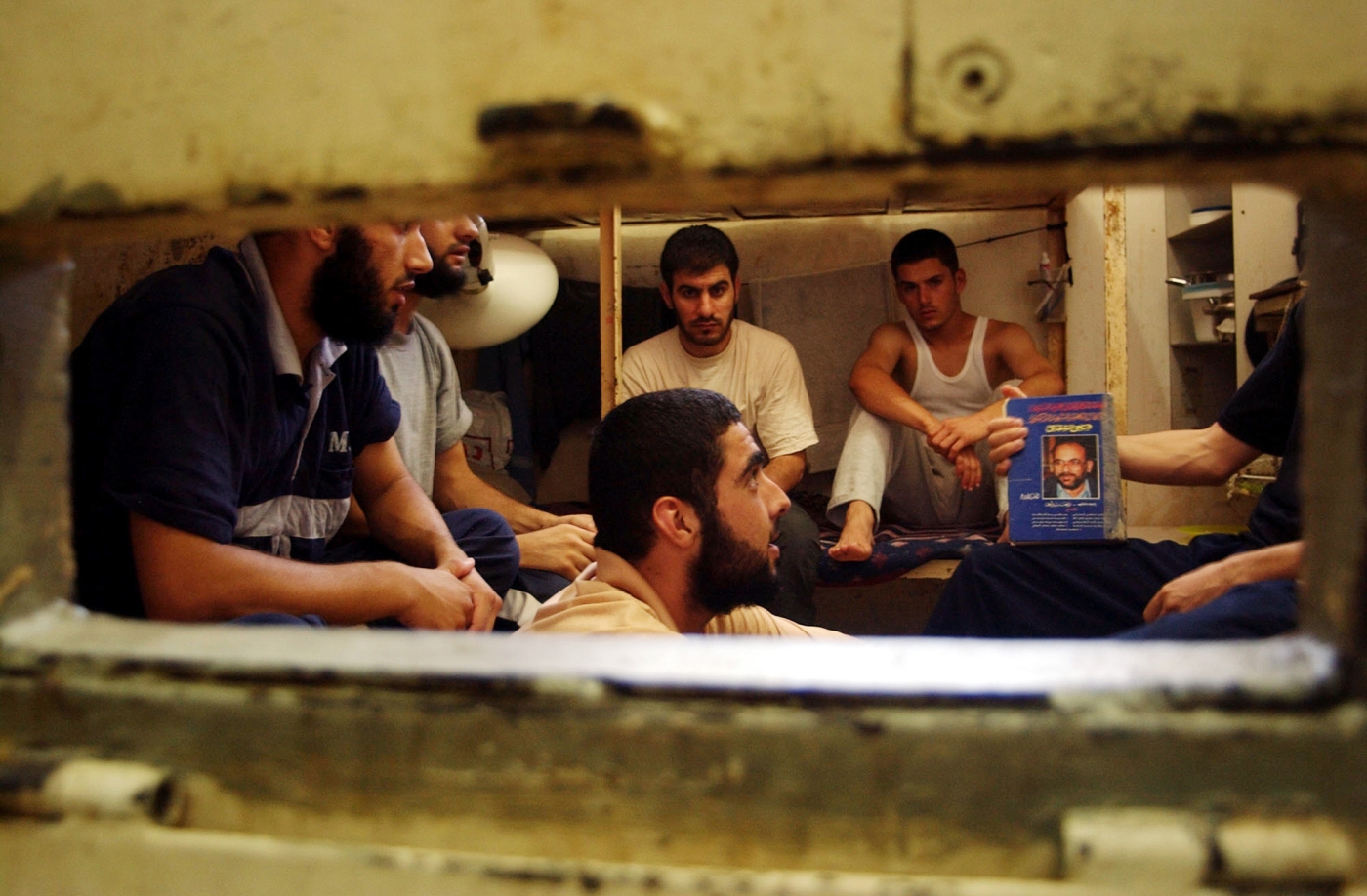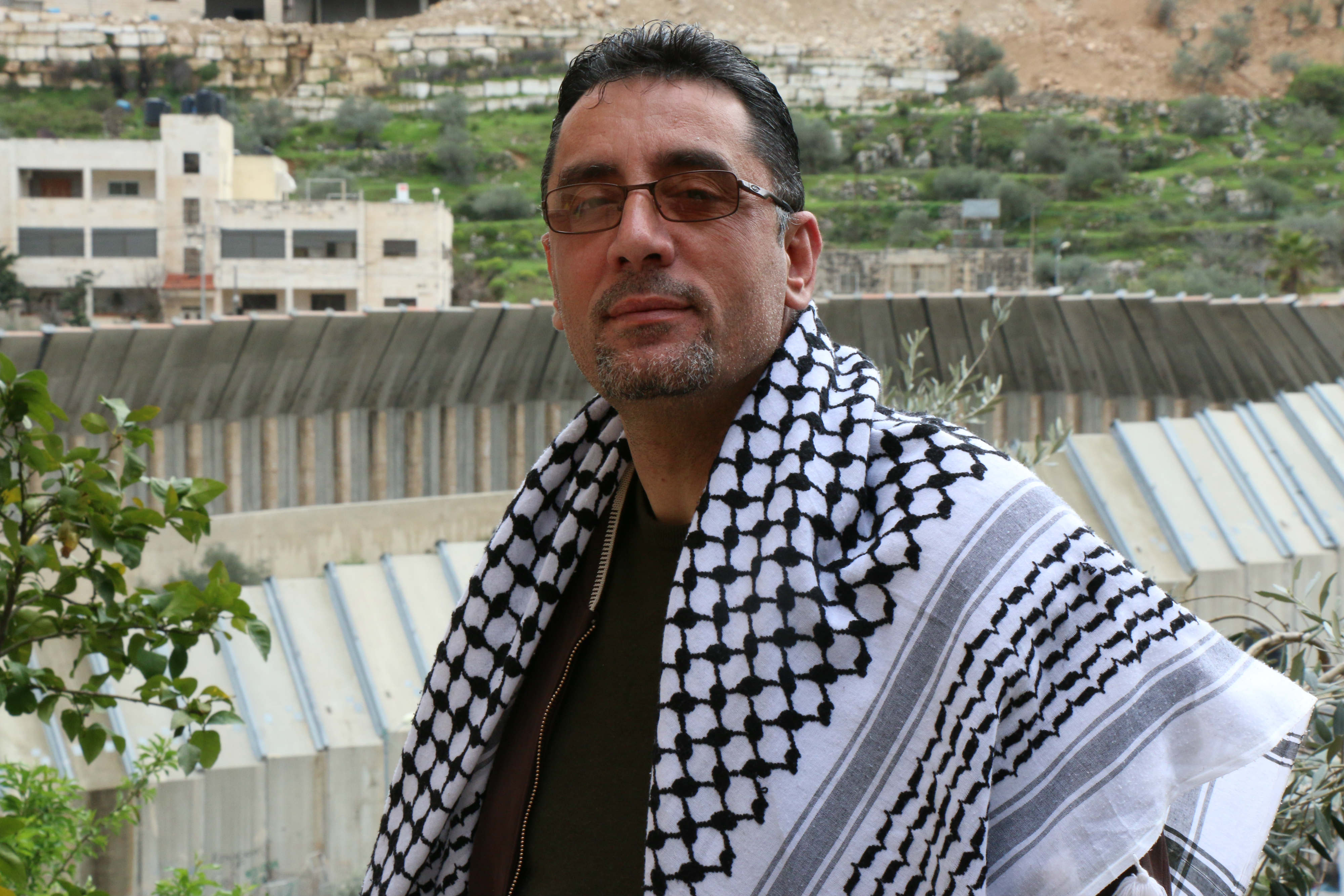Coronavirus: Palestinian inmates fear for their lives in filthy and crowded Israeli jails
Lack of hygiene products and packed cells leave prisoners fearing continued policy of 'deliberate medical negligence'

Palestinian prisoners sit in a prison cell in Ashkelon in 2004 (Reuters)
Published date: 13 March 2020 17:04 UTC | Last update: 22 hours 7 min ago
Fear and panic have characterised much of the past 10 days in the occupied West Bank, as the number of coronavirus cases continues to climb.
By Friday, the Palestinian Ministry of Health confirmed that the number of official cases had risen to 35, 34 of them in the southern West Bank city of Bethlehem.
But just as the measures taken by the government to stop the spread of the virus began to restore some sense of calm, Palestinians woke up to more dreadful news: the coronavirus had reached Israeli prisons, where thousands of Palestinian political prisoners are held.
The Palestinian Prisoners Affairs Committee reported that one prisoner from Ashkelon prison had come into contact with an Israeli doctor who had tested positive for the virus.
Qadri Abu Bakr, the head of the committee, announced that the unidentified prisoner, along with 19 others, was being held in quarantine as a result.
Meanwhile, Israeli and Palestinian media reported that there were suspected cases of the virus in two other prisons: Ramleh prison in central Israel, and the Moscobiya detention centre in Jerusalem.
In both Ramleh and Moscobiya, prisoners were put into quarantine after coming into contact with Israeli prison officers who were suspected of being exposed to the virus.
The Israeli Prison Services (IPS) announced plans to evacuate a prison near the Egyptian border to be used for quarantining prisoners exposed to the virus, and a halt in visits for Palestinian families of prisoners.
Palestinians, however, are concerned that the Israeli government and prison authorities are not taking the proper measures to prevent the spread of the virus and treat those who may become sick.
Dirty and overcrowded
“The Israeli prisons are notoriously old, dirty, overcrowded, and lacking in basic hygiene supplies,” Mohammed Abed Rabo, 48, a former Palestinian prisoner and activist told Middle East Eye.
“In the best prison, you have between six to ten prisoners in a room, but in many cases, you have more than that,” he said, adding that up to 120 prisoners mix at a time during meals and outdoor activities.

The level of overcrowding in Israeli prisons, Abed Rabo fears, will be one of the major factors that could advance a coronavirus outbreak amongst Palestinian prisoners.
In addition to that, he said, the lack of hygiene products such as hand sanitizer and soap will only make matters worse.
“The prisons are already terrible at providing prisoners with basic hygiene products and necessities,” Abed Rabo said, adding that he has received information through the lawyers of the affected prisoners that the IPS has made no noticeable changes inside prisons to address the issue.
“They should be giving prisoners masks, gloves, hand sanitizer, extra soap, the chance to wash their clothes and bed sheets more often,” he said. “But all they are doing is putting them in quarantine.”
Abed Rabo also claimed that the prisoners being put in quarantine are merely being thrown into the solitary confinement cells of the prisons.
“How can they possibly be getting the proper care that they need, when they are just being thrown in these disgusting isolation cells?” he asked. “Is this how you deal with sick human beings?”
'Deliberate medical negligence'
For years, Palestinian rights groups have recorded what they call a policy of “deliberate medical negligence” in Israeli prisons across the country.
It is estimated that since the Second Intifada, which ran from 2000 to 2005, 17 Palestinian prisoners have died as a direct result of medical negligence.
In a 2016 publication, prisoners' rights group Addameer noted the presence of at least 200 chronically ill patients, including two dozen cancer patients, dozens more suffering from physical and psychological disabilities, and 25 permanently residing in the Ramleh prison clinic.
“A number of these chronically ill patients have respiratory and heart issues, and autoimmune diseases,” Abed Rabo told MEE, highlighting the fact that a significant portion of the prison population are middle-aged or elderly men.
“The demographics of the prisoners match up with the demographics of those who are most susceptible to the deadly effects of the coronavirus,” he said. “And this is terrifying.”
Sick prisoners, Abed Rabo said, are already not receiving the proper medical treatment that they need.
“The doctors rarely come, patients with serious issues are often prescribed generic painkillers, and those who need treatments like dialysis and chemotherapy are not kept on a proper treatment schedule,” Abed Rabo said.
“So imagine if these prisoners are faced with a coronavirus outbreak,” he continued. “Do you think they would be given proper treatment?”
Despite the seriousness with which Israel is treating the coronavirus outbreak in its country, Abed Rabo said he doubts they would treat Palestinian prisoners with the same urgency.
“Time and time again, they have shown they don’t care about Palestinian lives, especially our prisoners, so why would that change now?”



0 Comments:
Post a Comment
Subscribe to Post Comments [Atom]
<< Home